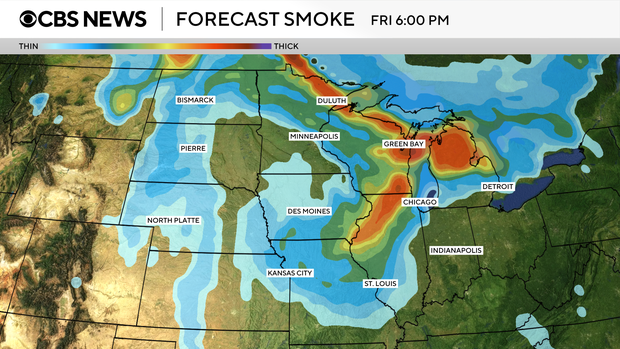Articles in this Cluster
01-06-2025
A military aircraft and helicopters are evacuating residents in the Canadian province of Manitoba due to fast-moving wildfires, with thousands already evacuated in western Canada. Manitoba and Saskatchewan have declared states of emergency and requested international help, with over 180 fires burning across the region, causing dense smoke to spread into parts of the US and affecting 22 million Americans' air quality.
01-06-2025
Roughly 17,000 residents in the Canadian province of Manitoba have been evacuated due to nearly two dozen active wildfires, with over 5,000 from Flin Flon. Manitoba declared a state of emergency on Wednesday, and thousands have also been affected by wildfires in Saskatchewan and Alberta. As of Saturday, 188 active fires were burning across Canada, with 100 considered "out of control." The Canadian Interagency Forest Fire Centre reported that smoke from the fires is being pushed south into parts of the US, worsening air quality. Saskatchewan Premier Scott Moe warned that the number of evacuees could rise from 8,000 to 10,000. The US has deployed an air tanker, 150 firefighters, and equipment to help Canada combat the fires. Evacuation centers have been opened across Manitoba, with some residents forced to stay in public buildings due to a shortage of hotel rooms.
01-06-2025
Wildfire smoke from over 90 out-of-control blazes in Canada is expected to impact air quality in the US on Friday and Saturday, with a massive 3,000-mile smoke plume stretching from Montana to the Atlantic. Air quality alerts have been issued for parts of the Upper Midwest, including Michigan, Minnesota, and Wisconsin, with cities like Madison and Duluth expected to have "unhealthy for sensitive groups" air quality on Friday. The situation is expected to worsen on Saturday, particularly in Minnesota, where air quality is forecast to be "unhealthy".
01-06-2025
Over 25,000 residents in three Canadian provinces, including Manitoba, Alberta, and Saskatchewan, have been evacuated due to dozens of active wildfires. Manitoba declared a state of emergency last week, with around 17,000 people evacuated, while Alberta and Saskatchewan have also seen significant evacuations, with 1,300 and 8,000 people relocated, respectively. The wildfires have reduced air quality and visibility in Canada and parts of the US, with some US states experiencing "unhealthy" air quality levels. The Canadian government and US agencies are working together to combat the fires and support evacuees.
